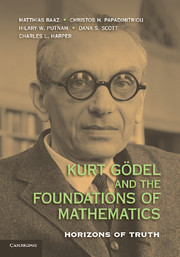Book contents
- Frontmatter
- Contents
- Contributors
- Foreword
- Preface
- Acknowledgments
- Short Biography of Kurt Gödel
- I Historical Context: Gödel's Contributions and Accomplishments
- 1 The Impact of Gödel's Incompleteness Theorems on Mathematics
- 2 Logical Hygiene, Foundations, and Abstractions: Diversity among Aspects and Options
- Gödel's Legacy: A Historical Perspective
- The Past and Future of Computation
- Gödelian Cosmology
- II A Wider Vision: The Interdisciplinary, Philosophical, and Theological Implications of Gödel's Work
- Gödel and the Mathematics of Philosophy
- Gödel and Philosophical Theology
- Gödel and the Human Mind
- III New Frontiers: Beyond Gödel's Work in Mathematics and Symbolic Logic
- The Realm of Set Theory
- Gödel and the Higher Infinite
- Gödel and Computer Science
- Index
2 - Logical Hygiene, Foundations, and Abstractions: Diversity among Aspects and Options
Published online by Cambridge University Press: 07 September 2011
- Frontmatter
- Contents
- Contributors
- Foreword
- Preface
- Acknowledgments
- Short Biography of Kurt Gödel
- I Historical Context: Gödel's Contributions and Accomplishments
- 1 The Impact of Gödel's Incompleteness Theorems on Mathematics
- 2 Logical Hygiene, Foundations, and Abstractions: Diversity among Aspects and Options
- Gödel's Legacy: A Historical Perspective
- The Past and Future of Computation
- Gödelian Cosmology
- II A Wider Vision: The Interdisciplinary, Philosophical, and Theological Implications of Gödel's Work
- Gödel and the Mathematics of Philosophy
- Gödel and Philosophical Theology
- Gödel and the Human Mind
- III New Frontiers: Beyond Gödel's Work in Mathematics and Symbolic Logic
- The Realm of Set Theory
- Gödel and the Higher Infinite
- Gödel and Computer Science
- Index
Summary
Preamble around (asymmetric) commonplaces about aspects (of objects in view) and options (for attention to rewarding aspects) in the subtitle related – also, but not only – to the present occasion: the idea(l)s of logical hygiene, foundations, and abstractions have been familiar for decades or more, but different aspects (and different functions of each aspect) of those idea(l)s have rewarded attention, often to points of diminishing returns in prominent directions, as experience around them has changed.
At least as read by some (of us) with logical BOR (background and other resources), many passages in the world's literature ever since the pre-Socratics refer to diversity among aspects, actually of any object including idea(l)s: any relation between the object and other things determines a property of the object, aka aspect (as seen from that other thing).
Remark on other commonplaces, too: not knowing them (or rather not remembering such items of common knowledge) when they are useful can be tiresome, but without combining them with more specific and thus more demanding (generally discovered) knowledge, they are rarely enough for progress; cf. below on logical hygiene for more on such asymmetric knowledge.
As to (changing) options – tacitly, with due regard to suitable equivalence relations – even for an object in view, as knowledge around it changes, different aspects of the object are liable to reward attention (with that changing BOR). Familiar pieties about first steps toward a focus on rewarding aspects often say more about the (b)rash faithful than the faiths.
- Type
- Chapter
- Information
- Kurt Gödel and the Foundations of MathematicsHorizons of Truth, pp. 27 - 54Publisher: Cambridge University PressPrint publication year: 2011
- 1
- Cited by



